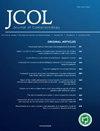Detection of Upper Gastrointestinal Disorders in Patients with Positive Fecal Immunochemical Test (FIT) and Normal Colonoscopy: A Cross-Sectional Study
Q4 Medicine
引用次数: 0
Abstract
Introduction Colorectal cancer (CRC) is the second most prevalent cancer in the world, and the fecal immunochemical test (FIT) can be mentioned among the CRC screening methods based on the detection of occult blood in the feces, which may indicate upper gastrointestinal (UGI) malignancies; therefore, patients with a positive FIT but normal colonoscopy may be considered for a UGI endoscopy. Materials and Methods The present study was conducted on patients with a positive FIT who were submitted to colonoscopy with normal results. They subsequently underwent endoscopy for the detection of UGI disorders. Results We included 121 patients (64.5% of women and 35.5% of men; average age: 58.85 ± 12.93 years), 72.7% of whom were positive for Helicobacter pylori. The predominant result of the UGI endoscopy was normal, followed by erythema of the gastric mucosa, and anemia and dyspepsia were the most common clinical findings. The most common pathological result was chronic gastritis, followed by acute gastritis. Only one patient presented stomach cancer (adenocarcinoma). Conclusion Considering the small prevalence of cancer in the UGI endoscopies of patients with positive FIT and normal colonoscopy, to the performance of UGI endoscopy in these patients may not be necessary.粪便免疫化学检验 (FIT) 阳性和结肠镜检查正常患者上消化道疾病的检测:一项横断面研究
导言 大肠癌(CRC)是世界上发病率第二高的癌症,而粪便免疫化学检验(FIT)可以说是 CRC 筛查方法中的一种,其原理是检测粪便中的隐血,隐血可能预示着上消化道(UGI)恶性肿瘤;因此,FIT 阳性但结肠镜检查正常的患者可考虑接受 UGI 内镜检查。材料与方法 本研究的对象是 FIT 阳性且结肠镜检查结果正常的患者。随后,他们接受了内窥镜检查,以发现胃肠道疾病。结果 我们共纳入 121 名患者(女性占 64.5%,男性占 35.5%;平均年龄:58.85 ± 12.93 岁),其中 72.7% 的患者幽门螺杆菌检测呈阳性。消化内镜检查的主要结果是正常,其次是胃黏膜红斑,贫血和消化不良是最常见的临床表现。最常见的病理结果是慢性胃炎,其次是急性胃炎。只有一名患者患有胃癌(腺癌)。结论 考虑到在 FIT 阳性和结肠镜检查正常的患者的消化道内窥镜检查中癌症的发病率较低,对这些患者进行消化道内窥镜检查可能没有必要。
本文章由计算机程序翻译,如有差异,请以英文原文为准。
求助全文
约1分钟内获得全文
求助全文
来源期刊

Journal of Coloproctology
Medicine-Gastroenterology
CiteScore
0.60
自引率
0.00%
发文量
41
审稿时长
47 weeks
 求助内容:
求助内容: 应助结果提醒方式:
应助结果提醒方式:


